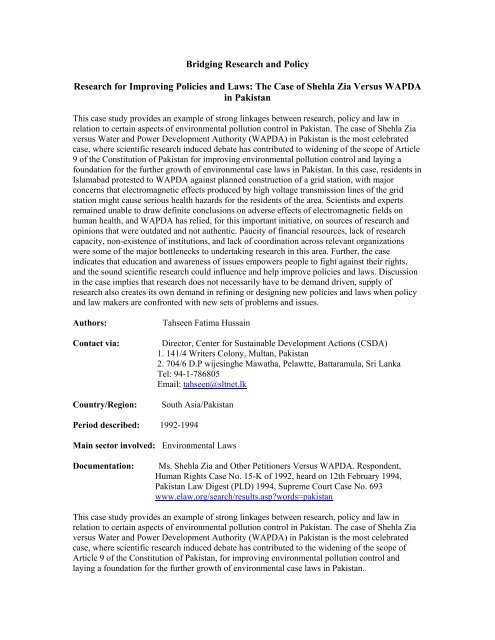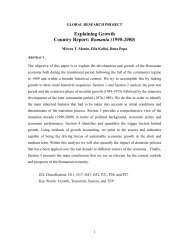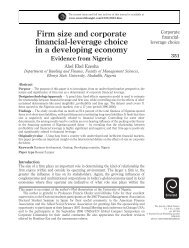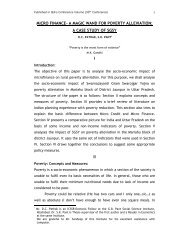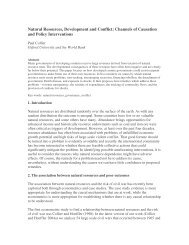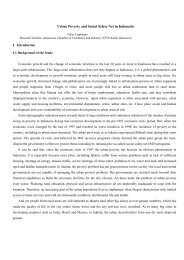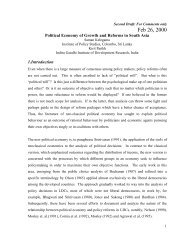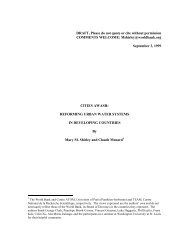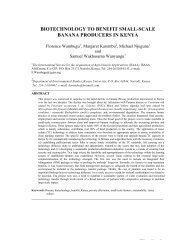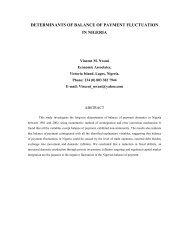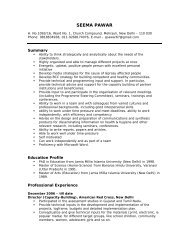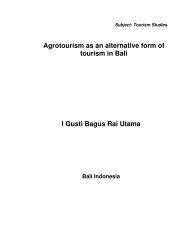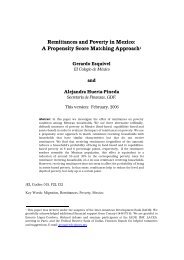The Case of Shehla Zia Versus WAPDA in Pakistan
The Case of Shehla Zia Versus WAPDA in Pakistan
The Case of Shehla Zia Versus WAPDA in Pakistan
Create successful ePaper yourself
Turn your PDF publications into a flip-book with our unique Google optimized e-Paper software.
Bridg<strong>in</strong>g Research and Policy<br />
Research for Improv<strong>in</strong>g Policies and Laws: <strong>The</strong> <strong>Case</strong> <strong>of</strong> <strong>Shehla</strong> <strong>Zia</strong> <strong>Versus</strong> <strong>WAPDA</strong><br />
<strong>in</strong> <strong>Pakistan</strong><br />
This case study provides an example <strong>of</strong> strong l<strong>in</strong>kages between research, policy and law <strong>in</strong><br />
relation to certa<strong>in</strong> aspects <strong>of</strong> environmental pollution control <strong>in</strong> <strong>Pakistan</strong>. <strong>The</strong> case <strong>of</strong> <strong>Shehla</strong> <strong>Zia</strong><br />
versus Water and Power Development Authority (<strong>WAPDA</strong>) <strong>in</strong> <strong>Pakistan</strong> is the most celebrated<br />
case, where scientific research <strong>in</strong>duced debate has contributed to widen<strong>in</strong>g <strong>of</strong> the scope <strong>of</strong> Article<br />
9 <strong>of</strong> the Constitution <strong>of</strong> <strong>Pakistan</strong> for improv<strong>in</strong>g environmental pollution control and lay<strong>in</strong>g a<br />
foundation for the further growth <strong>of</strong> environmental case laws <strong>in</strong> <strong>Pakistan</strong>. In this case, residents <strong>in</strong><br />
Islamabad protested to <strong>WAPDA</strong> aga<strong>in</strong>st planned construction <strong>of</strong> a grid station, with major<br />
concerns that electromagnetic effects produced by high voltage transmission l<strong>in</strong>es <strong>of</strong> the grid<br />
station might cause serious health hazards for the residents <strong>of</strong> the area. Scientists and experts<br />
rema<strong>in</strong>ed unable to draw def<strong>in</strong>ite conclusions on adverse effects <strong>of</strong> electromagnetic fields on<br />
human health, and <strong>WAPDA</strong> has relied, for this important <strong>in</strong>itiative, on sources <strong>of</strong> research and<br />
op<strong>in</strong>ions that were outdated and not authentic. Paucity <strong>of</strong> f<strong>in</strong>ancial resources, lack <strong>of</strong> research<br />
capacity, non-existence <strong>of</strong> <strong>in</strong>stitutions, and lack <strong>of</strong> coord<strong>in</strong>ation across relevant organizations<br />
were some <strong>of</strong> the major bottlenecks to undertak<strong>in</strong>g research <strong>in</strong> this area. Further, the case<br />
<strong>in</strong>dicates that education and awareness <strong>of</strong> issues empowers people to fight aga<strong>in</strong>st their rights,<br />
and the sound scientific research could <strong>in</strong>fluence and help improve policies and laws. Discussion<br />
<strong>in</strong> the case implies that research does not necessarily have to be demand driven, supply <strong>of</strong><br />
research also creates its own demand <strong>in</strong> ref<strong>in</strong><strong>in</strong>g or design<strong>in</strong>g new policies and laws when policy<br />
and law makers are confronted with new sets <strong>of</strong> problems and issues.<br />
Authors:<br />
Contact via:<br />
Country/Region:<br />
Tahseen Fatima Hussa<strong>in</strong><br />
Director, Center for Susta<strong>in</strong>able Development Actions (CSDA)<br />
1. 141/4 Writers Colony, Multan, <strong>Pakistan</strong><br />
2. 704/6 D.P wijes<strong>in</strong>ghe Mawatha, Pelawtte, Battaramula, Sri Lanka<br />
Tel: 94-1-786805<br />
Email: tahseen@sltnet.lk<br />
South Asia/<strong>Pakistan</strong><br />
Period described: 1992-1994<br />
Ma<strong>in</strong> sector <strong>in</strong>volved: Environmental Laws<br />
Documentation:<br />
Ms. <strong>Shehla</strong> <strong>Zia</strong> and Other Petitioners <strong>Versus</strong> <strong>WAPDA</strong>. Respondent,<br />
Human Rights <strong>Case</strong> No. 15-K <strong>of</strong> 1992, heard on 12th February 1994,<br />
<strong>Pakistan</strong> Law Digest (PLD) 1994, Supreme Court <strong>Case</strong> No. 693<br />
www.elaw.org/search/results.aspwords=pakistan<br />
This case study provides an example <strong>of</strong> strong l<strong>in</strong>kages between research, policy and law <strong>in</strong><br />
relation to certa<strong>in</strong> aspects <strong>of</strong> environmental pollution control <strong>in</strong> <strong>Pakistan</strong>. <strong>The</strong> case <strong>of</strong> <strong>Shehla</strong> <strong>Zia</strong><br />
versus Water and Power Development Authority (<strong>WAPDA</strong>) <strong>in</strong> <strong>Pakistan</strong> is the most celebrated<br />
case, where scientific research <strong>in</strong>duced debate has contributed to the widen<strong>in</strong>g <strong>of</strong> the scope <strong>of</strong><br />
Article 9 <strong>of</strong> the Constitution <strong>of</strong> <strong>Pakistan</strong>, for improv<strong>in</strong>g environmental pollution control and<br />
lay<strong>in</strong>g a foundation for the further growth <strong>of</strong> environmental case laws <strong>in</strong> <strong>Pakistan</strong>.
Residents <strong>of</strong> Block F-6/1 <strong>in</strong> Islamabad protested to <strong>WAPDA</strong> aga<strong>in</strong>st the planned construction <strong>of</strong> a<br />
power/grid station <strong>in</strong> the Block. <strong>The</strong>y po<strong>in</strong>ted out that the electromagnetic field caused by the<br />
presence <strong>of</strong> the high voltage transmission l<strong>in</strong>es at the grid station would pose a serious health<br />
hazard to the residents <strong>of</strong> the area, particularly the children, the <strong>in</strong>firm and the Dhobi-ghat<br />
families liv<strong>in</strong>g <strong>in</strong> the immediate vic<strong>in</strong>ity. <strong>The</strong> presence <strong>of</strong> electrical <strong>in</strong>stallations and transmission<br />
l<strong>in</strong>es would also be highly dangerous to the citizens, particularly the children who play outside <strong>in</strong><br />
the area and that it would damage the greenbelt and affect the environment. It was also alleged<br />
violate the pr<strong>in</strong>ciples <strong>of</strong> plann<strong>in</strong>g <strong>in</strong> Islamabad where the green belts are considered an essential<br />
component <strong>of</strong> the city for environmental and aesthetic reasons. <strong>The</strong> f<strong>in</strong>al hear<strong>in</strong>g <strong>of</strong> the <strong>Case</strong> was<br />
held at the Supreme Court <strong>of</strong> <strong>Pakistan</strong> on 12th February 1994. Both sides produced research<br />
material, <strong>in</strong>clud<strong>in</strong>g journal articles, expert op<strong>in</strong>ions and comments from relevant organizations to<br />
support their claims to the Court. <strong>The</strong>se <strong>in</strong>cluded published scientific material from developed<br />
countries (mostly US, Canada and Sweden), relevant research material and expert op<strong>in</strong>ions from<br />
the M<strong>in</strong>istry <strong>of</strong> Water and Power, Susta<strong>in</strong>able Development Policy Institute, Council <strong>of</strong> Scientific<br />
and Industrial Research, Lahore. <strong>The</strong> Court analyzed the material presented and its observations<br />
were as follows:<br />
'From the material produced on record, which conta<strong>in</strong>s updated studies and research, it seems that<br />
so far no def<strong>in</strong>ite conclusion has been drawn by the scientists and scholars, but the trend is <strong>in</strong><br />
support <strong>of</strong> the fact that there may be the likelihood <strong>of</strong> adverse effects <strong>of</strong> electromagnetic fields on<br />
human health. It is for this reason that <strong>in</strong> all the developed countries special care is be<strong>in</strong>g taken to<br />
establish organizations for carry<strong>in</strong>g on further research on the subject. <strong>The</strong> studies are, therefore,<br />
not certa<strong>in</strong>, but <strong>in</strong>ternationally there seems to be a consensus that the lurk<strong>in</strong>g danger which, <strong>in</strong> an<br />
<strong>in</strong>def<strong>in</strong>ite manner, has been found <strong>in</strong> <strong>in</strong>dividual <strong>in</strong>cident and studies, cannot be ignored'.<br />
<strong>WAPDA</strong> however <strong>in</strong>sisted on execut<strong>in</strong>g the plan, which accord<strong>in</strong>g to them is completely safe and<br />
risk free. <strong>The</strong> material submitted by <strong>WAPDA</strong> was based on studies carried out two decades ago.<br />
<strong>The</strong>ir other statement was based on personal observation <strong>of</strong> their workers work<strong>in</strong>g <strong>in</strong> grid stations<br />
and further afield where no such compla<strong>in</strong>t has been made. <strong>The</strong> research and op<strong>in</strong>ions relied upon<br />
by <strong>WAPDA</strong> are not the best nor from authentic sources as they were merely rely<strong>in</strong>g upon old<br />
op<strong>in</strong>ions. In the present-day controversies, where every day new avenues are opened up, new<br />
research is conducted and progress is be<strong>in</strong>g reported <strong>in</strong> the electrical fields, it would be advisable<br />
for <strong>WAPDA</strong> to employ better resources and personnel engaged <strong>in</strong> research and study to keep<br />
themselves up-to-date <strong>in</strong> scientific and technical knowledge, and adopt all measures necessary for<br />
safety aga<strong>in</strong>st the adverse effects <strong>of</strong> magnetic and electric fields.<br />
On the other hand, the materials placed by the petitioners were the latest research carried out<br />
exam<strong>in</strong><strong>in</strong>g the effects on health <strong>of</strong> magnetic fields and also on the possible dangers that may be<br />
caused to human be<strong>in</strong>gs. In the absence <strong>of</strong> any def<strong>in</strong>ite conclusion that electromagnetic fields do<br />
not cause childhood leukaemia and adult cancer, and <strong>in</strong> the presence <strong>of</strong> <strong>in</strong>conclusive studies, the<br />
subject requires further research. Thus the conclusions drawn earlier <strong>in</strong> favor <strong>of</strong> the power<br />
company are doubtful. <strong>The</strong> safest course seems to be to adopt a method by which danger, if any,<br />
may be avoided.<br />
<strong>The</strong> Court <strong>in</strong>dicated that ‘at this stage it is not possible to give a def<strong>in</strong>ite f<strong>in</strong>d<strong>in</strong>g on the claims <strong>of</strong><br />
either side. <strong>The</strong>re is a state <strong>of</strong> uncerta<strong>in</strong>ty and <strong>in</strong> such a situation the authorities should observe<br />
the rules <strong>of</strong> prudence and precaution. <strong>The</strong> rule <strong>of</strong> prudence is to adopt such measures which may<br />
avert the so-called danger, if it occurs. <strong>The</strong> rule <strong>of</strong> precautionary policy is to first consider the<br />
welfare and safety <strong>of</strong> the human be<strong>in</strong>gs and the environment and then to pick up a policy and<br />
execute the plan that is more suited to obviate the possible dangers to make such alternate
precautionary measures that may ensure safety. To stick to a particular plan on the basis <strong>of</strong> old<br />
studies or <strong>in</strong>conclusive research cannot be said to be a policy <strong>of</strong> prudence and precaution. <strong>The</strong>re<br />
are <strong>in</strong>stances <strong>in</strong> American Studies that the power authorities have been asked to alter and mould<br />
their program and plann<strong>in</strong>g <strong>in</strong> such a way that the <strong>in</strong>tensity and the velocity is kept at the lowest<br />
level’.<br />
Further, it was observed that ‘it is a highly technical subject upon which the Court would not like<br />
to give a def<strong>in</strong>ite f<strong>in</strong>d<strong>in</strong>g, particularly when the experts and technical evidence produced are<br />
<strong>in</strong>conclusive. In these circumstances the balance should be struck between the rights <strong>of</strong> the<br />
citizens and also the plans which are executed by the power authorities for welfare, economic<br />
progress and prosperity <strong>of</strong> the country … One cannot ignore that energy is essential for presentday<br />
life, <strong>in</strong>dustry, commerce, and day-to-day affairs. <strong>The</strong> more energy is produced and<br />
distributed, the more progress and economic development become possible. <strong>The</strong>refore, a method<br />
should be devised to strike balance between economic progress and prosperity and to m<strong>in</strong>imize<br />
possible hazards’.<br />
<strong>The</strong> Court further recommended that ‘<strong>in</strong> fact a policy <strong>of</strong> susta<strong>in</strong>able development should be<br />
adopted. It will thus require a deep study <strong>in</strong>to the plann<strong>in</strong>g and the methods adopted by <strong>WAPDA</strong><br />
for construction <strong>of</strong> the grid station. <strong>The</strong> studies <strong>in</strong> USA referred to above have suggested that<br />
certa<strong>in</strong> modes can be adopted by which high tension frequency can be decreased. This is a purely<br />
scientific approach which has to be dealt with and decided by the technical and scientific persons<br />
<strong>in</strong>volved <strong>in</strong> it. It is for this reason that both the parties have agreed that NESPAK (National<br />
Eng<strong>in</strong>eer<strong>in</strong>g Services <strong>of</strong> <strong>Pakistan</strong>) should be appo<strong>in</strong>ted as a Commissioner to exam<strong>in</strong>e the plan<br />
made by the petitioners and submit its report and if necessary to suggest any alteration or addition<br />
which may be economically possible for construct<strong>in</strong>g a grid station’.<br />
It was highlighted that ‘be<strong>in</strong>g a develop<strong>in</strong>g country we will need many such grid stations and<br />
l<strong>in</strong>es for transmission <strong>of</strong> power. It would, therefore, be proper for the Government to establish an<br />
Authority or Commission manned by <strong>in</strong>ternationally known and recognized scientists hav<strong>in</strong>g no<br />
bias and prejudice to be members <strong>of</strong> such Commission whose op<strong>in</strong>ion or permission should be<br />
obta<strong>in</strong>ed before any new grid station is allowed to be constructed. Such Commission should also<br />
exam<strong>in</strong>e the exist<strong>in</strong>g grid stations and the distribution l<strong>in</strong>es from the po<strong>in</strong>t <strong>of</strong> view <strong>of</strong> health<br />
hazards and environmental pollution. If such a step is taken by the Government <strong>in</strong> time much <strong>of</strong><br />
the problem <strong>in</strong> future can be avoided’.<br />
As a result <strong>of</strong> scientific debate <strong>in</strong> this case, the Court has expanded the ambit <strong>of</strong> article 9 <strong>of</strong> the<br />
Constitution <strong>of</strong> <strong>Pakistan</strong> to <strong>in</strong>clude the right to health services and quality <strong>of</strong> life. <strong>The</strong> court<br />
upheld the view that the word ‘Life’ <strong>in</strong> article 9 does not simply mean animal life or vegetative<br />
existence. It stated that life <strong>in</strong>cludes all such amenities and facilities, which a person born <strong>in</strong> a<br />
free society, is entitled to enjoy, <strong>in</strong> dignity and honor. ‘<strong>The</strong> word “Life” <strong>in</strong> the Constitution has<br />
not been used <strong>in</strong> a limited manner. A wide mean<strong>in</strong>g should be given to enable a man not only to<br />
susta<strong>in</strong> life but to enjoy it’.<br />
Key Po<strong>in</strong>ts and Lessons<br />
Scientists and experts rema<strong>in</strong>ed unable to draw def<strong>in</strong>ite conclusions on adverse effects <strong>of</strong><br />
electromagnetic fields on human health – as research on the subject rema<strong>in</strong>ed controversial and<br />
<strong>in</strong>conclusive.<br />
<strong>WAPDA</strong> has relied, for this important <strong>in</strong>itiative, on sources <strong>of</strong> research and op<strong>in</strong>ions that are<br />
neither the latest nor authentic. It rema<strong>in</strong>ed unable to undertake <strong>in</strong>-depth research on the subject<br />
due to lack <strong>of</strong> resources, both f<strong>in</strong>ancial and human, and lacked research capacity.
It is argued that <strong>Pakistan</strong> be<strong>in</strong>g a develop<strong>in</strong>g country cannot afford the research studies<br />
undertaken <strong>in</strong> the developed countries on address<strong>in</strong>g the scientific problems <strong>in</strong> the field <strong>of</strong><br />
environment, as <strong>in</strong> this case.<br />
Non-existence <strong>of</strong> an <strong>in</strong>stitution responsible for formulat<strong>in</strong>g and implement<strong>in</strong>g effective policies<br />
related to the environment, as <strong>in</strong> this case – the Court strongly directed that Government should<br />
establish an authority or commission manned by <strong>in</strong>ternationally known and recognized scientists<br />
whose op<strong>in</strong>ions should be obta<strong>in</strong>ed before any such <strong>in</strong>itiative is undertaken (such as <strong>in</strong>stallation<br />
<strong>of</strong> a new grid station).<br />
Clearly, there was lack <strong>of</strong> coord<strong>in</strong>ation across various departments, m<strong>in</strong>istries, research<br />
organizations and NGOs.<br />
Need for new knowledge and scientific research is clearly recognized for susta<strong>in</strong>able<br />
development policy formulation. In other words <strong>in</strong> policy and law formulation, the need for<br />
scientific research is clearly highlighted.<br />
A large number <strong>of</strong> people may suffer from adverse health effects related to environmental<br />
problems such as this unknow<strong>in</strong>gly because <strong>of</strong> lack <strong>of</strong> awareness, <strong>in</strong>formation and education.<br />
Policies and laws are made <strong>in</strong> order to enhance the well be<strong>in</strong>g <strong>of</strong> a nation as a whole. However, <strong>in</strong><br />
most cases the potential benefits or dis-benefits may not be obvious or the issue may be too<br />
abstract or complex for the public at large, imply<strong>in</strong>g that education and awareness rais<strong>in</strong>g should<br />
be an important component <strong>of</strong> new <strong>in</strong>itiatives to the complex problems.<br />
Awareness <strong>of</strong> issues empowers people to fight for their rights, and sound scientific research could<br />
<strong>in</strong>fluence and help improve policies and laws.<br />
Demand for research for law and policy mak<strong>in</strong>g generally comes from law and policy makers<br />
who are <strong>in</strong>terested <strong>in</strong> the relevant issues, and from general public, if the public is made aware <strong>of</strong><br />
the problems and new <strong>in</strong>itiatives to solve these problems and their consequences through<br />
education and awareness rais<strong>in</strong>g.<br />
Research does not necessarily have to be demand driven, supply <strong>of</strong> research also creates its own<br />
demand <strong>in</strong> ref<strong>in</strong><strong>in</strong>g or design<strong>in</strong>g new policies and laws when policy and law makers are<br />
confronted with new sets <strong>of</strong> problems and issues.<br />
No clear policies and laws can be formulated without sound scientific research and knowledge.<br />
References<br />
Ms. <strong>Shehla</strong> <strong>Zia</strong> and Others – Petitioners, <strong>Versus</strong> <strong>WAPDA</strong> – Respondent, Human Rights <strong>Case</strong> No.<br />
15-K <strong>of</strong> 1992, heard on 12th February 1994, <strong>Pakistan</strong> Law Digest (PLD) 1994, Supreme Court<br />
<strong>Case</strong> No. 693<br />
Electronic copy <strong>of</strong> the case available at:<br />
www.elaw.org/search/results.aspwords=pakistan


